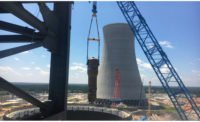Georgia Power, in a quest to finish building its Plant Vogtle nuclear expansion, was set to reaffirm its plans as the state Public Service Commission holds hearings on the matter the week of Dec. 11. While recent testimony by PSC analysts has gone as far as recommending halting construction, a source familiar with the case indicates commissioners may be lining up to approve the project’s completion.
The utility’s case has endured sharp criticism from Georgia PSC staff analysts who have argued adamantly to not allow construction to proceed on the late, overbudget project with ratepayers’ absorbing all the expense. Instead, they want the utility, and its stockholders, to bear more of the cost.
Citing the utility’s lax oversight, as well as its unmet promises to the state Public Service Commission of pro-active management, the state’s construction analysts recommended that as much as $3.9 billion less than Georgia Power requested be passed along to ratepayers.
Combined with the opinion of state’s economics analysts that continuing with construction would be an “uneconomic” choice compared to other alternatives—by a deficit of roughly $1.6 billion—that testimony provided the backdrop to the hearings.
The state staff’s strongly worded testimony was notable for several reasons. First, Georgia Power had emphasized in August that if the PSC deemed “any” portion of the project’s estimated construction or financing costs as “unreasonable or imprudent”—and therefore unrecoverable from ratepayers—the utility project owners would not be able to continue construction.
Numerous Project Execution Risks Remain
When Georgia Power—which owns 45.7% of the Vogtle project—announced in August that it planned to proceed with construction, the utility included several analyses of the potential risks. At the time, the utility’s project completion estimate totaled $9.45 billion, bringing the total for the two-reactor project to approximately $19 billion. Georgia Power revised commercial operation dates of Units 3 and 4 to November 2021 and November 2022, respectively.
"Completing the Vogtle 3 and 4 expansion will enable us to continue delivering clean, safe, affordable and reliable energy to millions of Georgians, both today and in the future," Paul Bowers, CEO of Georgia Power, said back in August.
State construction monitors questioned many of the assumptions supporting the utility’s project analyses.
Construction analysts Steven Roetger, Ralph Smith and William Jacobs, the state construction monitor, noted that Georgia Power’s estimate to complete (ETC) “assumes that design completion, procurement, document closure, the possibility of future quality issues and the availability of needed heavy equipment will support the construction schedule. These are some of the very issues that have impacted the project in the past and have caused much of the delay incurred to date.”
The analysts testified that “thousands of design changes … impacted construction. Quality issues with modules, among others, resulted in significant delays … and impacted attempts to stand up new vendors. To assume that these types of issues will not impact the construction schedule going forward is questionable.”
According to the PSC staff’s testimony, Georgia Power has incurred $5.85 billion in costs, including $4.44 billion in capital and construction expenses. The utility will require an additional $6.33 billion to complete the project.
The project still faces risks that include: lower-than-expected productivity and challenges related to procurement, unidentified scope and testing/startup, say analysts.
Was Utility Powerless to Manage EPC Contractor?
In recent months, the Vogtle project team—now led by Bechtel, working for Southern Nuclear, a subsidiary of Southern Co.—has made productivity gains at the project site, say monitors, noting: “This improvement is due in part to increased emphasis on accountability, simplified work packages, increased constructability reviews and more experienced supervision in the field.”
Those gains reportedly arise from a change in project management, including the formal addition of Bechtel, as well as Southern Nuclear, which is now able to manage more directly due to the elimination of the engineer-procure-construct contract previously held by Westinghouse Electric Co. Georgia Power claims that EPC contract prevented the utility from influencing Westinghouse’s project management.
The testimony of Roetger, Smith and Jacobs pushed back against that notion in a couple of ways, first by quoting Georgia Power officials’ previous testimony.
“During the certification proceeding, the company’s panel witnesses of Edward Day III and Jeffrey Burleson stated under oath during re-direct that the company would be ‘active managers’ of the project and that the company would ‘…have people on site day to day, week to week, month to month, that are watching the processes, watching the schedules, getting advanced schedules for us to look and see if they're appropriate and we're going to hold the consortium accountable for those schedules and methods and processes.’”
The state analysts noted that the EPC agreement allowed Georgia Power to require Westinghouse to provide a recovery plan in the case of project delays. The watchdogs concluded that the responsibility for the overruns rests with Georgia Power.
“The financial impact of the contractor’s failure to perform its scope of work should not be passed onto ratepayers,” they concluded. “It would be unreasonable for the additional cost arising from the company’s and the contractor’s failures to meet their commitments of the project to be absorbed by ratepayers.”
In turn, Georgia Power pushed back against the notion that it failed to properly manage the project.
"We disagree with any claim that Georgia Power has not made every effort and taken every available action to make the Vogtle project successful," utility spokesman Jacob Hawkins told ENR via email. "Prior to Westinghouse’s bankruptcy, Georgia Power’s oversight and management role was defined by the EPC agreement and discussed throughout the VCM process with a clear distinction between Georgia Power’s management of the EPC agreement and the primary contractor’s (Westinghouse) management of construction activities and project progress. Maintaining this distinction was essential for ensuring protections for our customers under the original EPC agreement."
Harsh Testimony, but PSC Approval?
The Georgia PSC’s staff testimony appears to provide commissioners with justification to halt the disastrously behind-schedule, over-budget project. Sara Barczak with the Southern Alliance for Clean Energy agrees. In a Dec. 6 press statement, she offers that “Georgia Power customers cannot and should not bear the additional costs and risks associated with continuing this off-track project. We hope that the Commissioners will closely consider the evidence and recommendations and keep the interests of customers in the forefront of their minds during next week’s hearing. Customers have already shouldered considerable risk and if the company chooses to go forward, the Commission must ensure that the company and its shareholders are held accountable and take responsibility for the increased costs and remaining risks.”
Tom Clements, senior adviser with the Friends of the Earth (FOE), another intervenor said: “The testimony serves as a clear warning to the commissioners that another rubber stamp of what Georgia Power is requesting in no way will provide an assurance that the project can continue to completion.”
Still, Georgia Power announced Dec. 5 that it has reached a new agreement with Toshiba, Westinghouse’s parent company, to receive all remaining scheduled payments from Toshiba in the amount of $3.2 billion by Dec. 15.
On Dec. 11, the Georgia PSC updated the “procedural and scheduling order” for the Plant Vogtle docket, indicating that “the Commission will render a decision in this docket” on Dec. 21. The schedule update also indicated Feb. 6., 2018, as a fall-back date for a decision, if necessary.
Georgia Power reportedly waived the opportunity for rebuttal if the PSC announces its decision in December, with a source familiar with the project indicating this could signal that commissioners are preparing to approve continuing construction.
“It has looked to me like they may give the go-ahead for now but the facts have strongly lined up for termination, so they and Georgia Power are under growing pressure,” commented Clements with FOE. “Even if approval to continue is now given, the project will remain on thin ice and could well fail in the near future due to cost, schedule, design and construction problems.”






Post a comment to this article
Report Abusive Comment